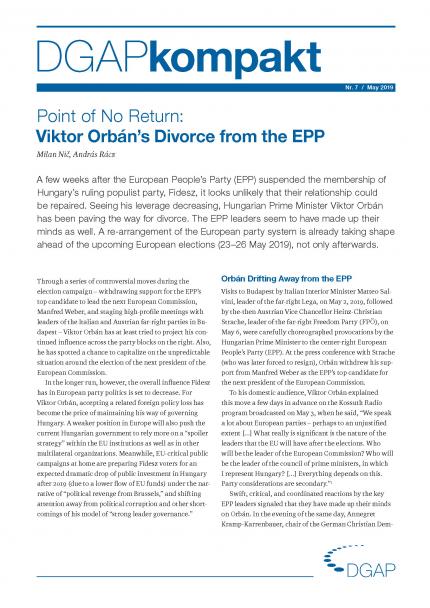Through a series of controversial moves during the election campaign – withdrawing support for the EPP’s top candidate to lead the next European Commission, Manfred Weber, and staging high-profile meetings with leaders of the Italian and Austrian far-right parties in Budapest – Viktor Orbán has at least tried to project his continued influence across the party blocks on the right. Also, he has spotted a chance to capitalize on the unpredictable situation around the election of the next president of the European Commission.
In the longer run, however, the overall influence Fidesz has in European party politics is set to decrease. For Viktor Orbán, accepting a related foreign policy loss has become the price of maintaining his way of governing Hungary. A weaker position in Europe will also push the current Hungarian government to rely more on a “spoiler strategy” within the EU institutions as well as in other multilateral organizations. Meanwhile, EU-critical public campaigns at home are preparing Fidesz voters for an expected dramatic drop of public investment in Hungary after 2019 (due to a lower flow of EU funds) under the narrative of “political revenge from Brussels,” and shifting attention away from political corruption and other shortcomings of his model of “strong leader governance.”
Orbán Drifting Away from the EPP
Visits to Budapest by Italian Interior Minister Matteo Salvini, leader of the far-right Lega, on May 2, 2019, followed by the-then Austrian Vice Chancellor Heinz-Christian Strache, leader of the far-right Freedom Party (FPÖ), on May 6, were carefully choreographed provocations by the Hungarian Prime Minister to the center-right European People’s Party (EPP). At the press conference with Strache (who was later forced to resign), Orbán withdrew his support from Manfred Weber as the EPP’s top candidate for the next president of the European Commission.
To his domestic audience, Viktor Orbán explained this move a few days in advance on the Kossuth Radio program broadcasted on May 3, when he said, “We speak a lot about European parties – perhaps to an unjustified extent [...] What really is significant is the nature of the leaders that the EU will have after the elections. Who will be the leader of the European Commission? Who will be the leader of the council of prime ministers, in which I represent Hungary? [...] Everything depends on this. Party considerations are secondary.”
Swift, critical, and coordinated reactions by the key EPP leaders signaled that they have made up their minds on Orbán. In the evening of the same day, Annegret Kramp-Karrenbauer, chair of the German Christian Democratic Union (CDU), signaled that with his latest steps, Viktor Orbán had crossed the line and gave a clear sign that he is going to leave the center-right political family. The EPP tried to build a bridge to Fidesz, but its leader had chosen another route, she added. The next day, EPP President Joseph Daul said that if Viktor Orbán continues to attack and vilify the EU, his party will be excluded from the block or encouraged to quit by its own decision.
Can such a prognosis be supported by enough arguments?
Suspension of Fidesz: Strings Attached
Before we look at the likely scenarios, here’s a brief recap of the EPP decision to suspend Fidesz. It was a result of a turbulent political debate at the EPP’s Political Assembly on March 20 in Brussels, after 13 member parties (mostly from Northern and Western Europe) demanded the expulsion of the Hungarian ruling party, or at least a discussion of its membership. According to the resolution adopted with an overwhelming majority of EPP representatives, Fidesz membership in the group remains suspended until it meets a set of conditions, discussed in detail below.
To his domestic audience, Prime Minister Orbán presented it as a tactical victory. According to the Fidesz narrative of the same events, the suspension of its membership in Europe’s main center-right group came at Fidesz’s own request. In fact, the final decision came as a compromise between Viktor Orbán and the majority of the EPP: both sides agreed that they could communicate the developments as they preferred, and this is why the final text included a reference that said Fidesz’s membership was suspended at its own request.
“We have gained time,” Orbán said on the Kossuth Radio program broadcasted on March 24. He continued, “After the European elections, within Fidesz, we will decide what is best for Hungary: whether we should continue within the People’s Party, or if our place is instead with some new form or party alliance.” In other words, Orbán intends to keep all options open and decide his future course based on the results of the EP elections and on the new power balance among Europe’s political groups.
Balance Sheet: Fidesz Not on Track to Meet EPP’s Conditions
According to the deal from March 20, a three-man panel will evaluate whether Fidesz has fulfilled two sets of conditions. The first one is set up by the EPP top candidate, Manfred Weber, while the second is based on the resolution adopted at the November 2018 EPP Congress in Helsinki about whether Fidesz is acting in accordance with the EPP’s rules and values. The “Three Wise Men” panel is composed of Hans-Gert Pöttering, former President of the European Parliament, former Austrian Chancellor Wolfgang Schüssel, and is chaired by Herman Van Rompuy, former President of the European Council. The Helsinki resolution calls for every EPP member party to subscribe to and guarantee the functioning of democratic institutions, the separation of power, law, and judiciary, while condemning restrictions to media freedom and an insufficient transparency of media ownership in some EU member states.At present, out of the three conditions set by Manfred Weber, the first and second are only partially fulfilled; the Hungarian government’s campaign against Jean-Claude Juncker was halted only by March 15, even though EPP demanded an immediate stop. In regards to the second condition, while Orbán kind of apologized to the other EPP member parties whom he had publicly referred to as “useful idiots,” he did not acknowledge the damage caused by his statements, though Weber demanded him to do so. Moreover, a negative “information campaign” against the EU has been continuing uninterrupted in the Hungarian government-controlled media, making Weber’s demand that Prime Minister Orbán “permanently end his government’s anti-Brussels campaigns” still relevant.
The third condition – ensuring the existence of the Central European University (CEU) in Budapest – remains open. A possible solution was brokered by Manfred Weber himself on getting the Technical University of Munich (TUM) to cooperate with the Central European University (CEU) might de jure provide CEU with the opportunity to stay in Budapest, as by this cooperation, the university would fulfill the criteria set by the Hungarian government’s law. However, in fact, not much is happening on this front, probably indicating that Orbán intends to also postpone this issue until after the EP elections.
Regarding the fulfillment of the Helsinki commitments, related problems are multifold on the Hungarian side: besides the radically worsening freedom of media, the restrictive NGO law is still in place, and the setup of the so-called Administrative Courts (a new framework that would allow government-appointed judges to decide in cases related to the government’s use of power, as well as in election matters) is going on. Moreover, recently, a massive governmental attack has started against the independence of the Hungarian Academy of Sciences (HAS) and its research institutions. The Helsinki resolution also explicitly demanded Fidesz “refrain from campaigns that target EU institutions such as Commission and Parliament,” but there has been no progress on this at all – Fidesz has not changed its course.
All these combined leave little hope for a constructive settlement of the debate between EPP and Fidesz.
The Current Position of Fidesz Is Unsustainable
In order to assess the possible outcomes, one needs to see clearly that the current position of Fidesz (suspended membership for an indefinite period) is the weakest possible one that party can have. Suspension effectively locks Fidesz out from influencing the key debates and decisions about the EPP’s future course. At the same time, it cannot join any other parties, either, as it is still a suspended EPP member. Hence, the present status is unlikely to prevail for long, because it keeps Fidesz in a disabled, powerless position, and this is something Orbán is not likely to tolerate for too long.
This is particularly so because the very setup of the three-man panel provides the EPP with an important leverage over Fidesz: time. The panel has no deadline for delivering its assessment, nor does EPP for reacting to it. In other words, EPP is able to keep Fidesz in a suspended position for a longer period of time, and Fidesz has no institutionalized way to counter this.
This basically leaves open three scenarios for what is going to happen between Fidesz and Europe’s center-right block after the EP elections (as you can see in the table above).
Scenario 1:
|
Scenario 2:
|
Scenario 3:
|
| The better Euro-skeptic forces perform compared to the EPP, the more likely this scenario is, as changing affiliation would increase Orbán’s relative influence in the next EP as a whole. Orbán might well try to sell his leaving of the EPP to the CDU/CSU as a gesture of damage control – i.e., that by voluntarily exiting, he saved both major parties from the inconvenience of risking a rift in the group over another voting on Fidesz’s membership. The probability of this scenario increases if the election performance of Fidesz is strong, allowing Orbán to have a relatively bigger influence in the new Euro-skeptic group, and if he is followed by other EPP splinters. |
Based on the Three Wise Men report, as well as further moves by Fidesz toward the Euro-skeptic group in the new European Parliament, a vote is triggered at the EPP’s Political Assembly ahead of the November 2019 party congress in Zagreb and results in Fidesz being kicked out from the center-right camp. This scenario would allow Viktor Orbán to inflict significant damage to the coherence of the EPP, but it is highly unlikely due to the negative domestic political implications (i.e., a spectacular defeat ahead of the upcoming local elections in Hungary) and would probably be more harmful for Fidesz at home. Therefore, Orbán is more likely to move first before he is expelled. |
Orbán decides to try for a “comeback” with the center-right block. In this case, Fidesz’s suspension would prevail for a while, and the post-election period would bring intensive maneuvering by Orbán to win allies within the EPP for a vote to restore Fidesz’s membership. This would assume an internal re-balancing within the EPP (a stronger position for more conservative, anti-migration parties from France and Spain, and electoral setback for German CDU/CSU). However, this scenario would renew friction between the EPP and other pro-EU political families, complicating the formation of a stable majority in the next EP. Orbán’s proposed plan for a coalition with the Euro-skeptic groups is not viable, as it would split the EPP. |
Conclusions
The next steps in this political saga will be taken after the European elections and before the next EPP Congress in November 2019. Given Orbán’s unwillingness to make any meaningful change to his domestic political course, the most likely outcome of the present stalemate is that Fidesz will voluntarily leave the EPP political family.
Viktor Orbán has overplayed his hand and is now forced to create his “Plan B” in coordination with leaders of far-right, hoping that Matteo Salvini will succeed in forming a powerful political group in the new European Parliament.
The approaching local elections in Hungary – to be held in the autumn of 2019 – makes it inevitable that Fidesz voters will be mobilized once again after the summer break. An externally driven compromise on the EPP conditions would be perceived as a sign of weakness and have a demobilizing effect, in particular when preceded by such a high level of confrontation. Domestic politics still enjoys a priority in Orbán’s political planning, and if his way of governing Hungary induces foreign policy-related losses, he is more ready to take them than to change his domestic political course.
In other words, abandoning EPP membership and accepting the related foreign policy loss has become the price of maintaining his way of governing Hungary. But this will not make the life of the new European Parliament easier, as Orbán is likely to conduct a spoiler strategy in a more systematic way.
Meanwhile, a prolonged Brexit process will have an impact on the composition of the political groups in the new EP, which will also include British parliamentarians, at least temporarily. Without a strong British member, the EPP is going to suffer, which will make Viktor Orbán’s controlled block of votes (14-15 Fidesz MEPs plus 2-3 ethnic Hungarians from Romania and Slovakia) more important in the final count. However, EPP leaders seem to be ready to sacrifice short-term tactical gains from Fidesz for a bigger game of forming a new functional majority with the Socialists and liberals, both of which are highly critical of Orbán.
His space to maneuver on the EU level will be determined by at least three factors: the weakness (divisions/fragmentation) of the pro-EU camp; the willingness of his allies in the Council to support him (in particular Italy and Poland) and their internal developments, including the upcoming parliamentary elections in Poland, in particular; and by the new leaders of the EU institutions (how transactional they would be).
Playing a spoiler role may often increase the relative influence of a small country inside an institutionalized system. Besides, conducting a strongly EU-skeptical policy might also allow the populist Hungarian Prime Minister to explain the drying out of EU funds to his electorate as the “revenge” of the EU against Budapest.
This primarily affects the next EU budgetary cycle (2021-2027), from which Hungary is expected to get much less in cohesion funds than it did in the current period. Fidesz politicians already started to publicly discuss the possibility of an economic slowdown starting in 2020. From this perspective, the anti-EU campaigning, which was not stopped in spite of repeated appeals from the EPP, might well indicate that Orbán needs such a negative public mood in the long run.
In order to replace the likely drying up EU resources, at least partially, Hungary has already been actively improving its foreign policy and business ties with non-EU countries, primarily with Russia and China, which are already financing large-scale infrastructural projects in Hungary (e.g., the Paks Nuclear Power Plant, the Belgrade-Budapest railway line). Oligarchs close to the Fidesz government and their construction companies will benefit from both projects under the public investment scheme. Prime Minister Orbán is already diversifying the sources of the external funding necessary for bridging the gap. Although the Russian and Chinese loans combined would not be sufficient to completely replace EU resources, they might still be sufficient to sustain the political machinery and corruption behind Viktor Orbán’s power structure in Hungary well beyond 2020.



